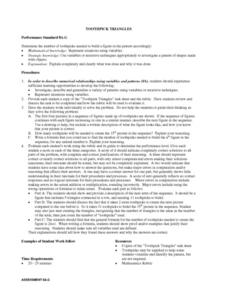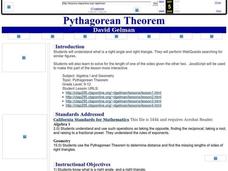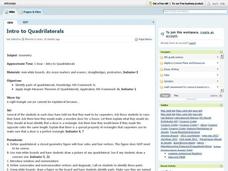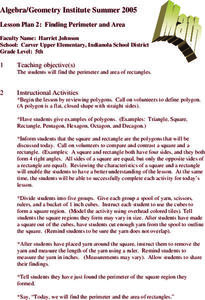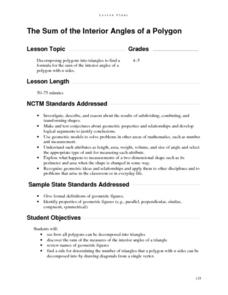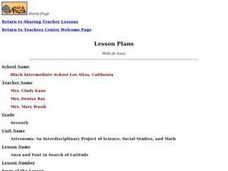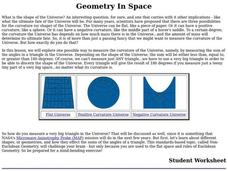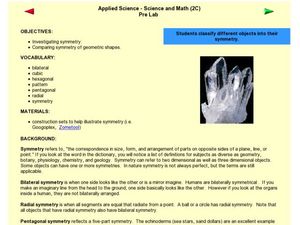Curated OER
Angle Pairs
Students practice identifying right, vertical, and adjacent angles using a Smartboard. They then determine measurements of all of the angles when only one measurement is given.
Curated OER
Toothpick Triangles
Students draw a chart (included in the lesson) to use with their investigation. They review terminology of triangles and receive toothpicks to use in the lesson. Beginning with three toothpicks, students form a triangle. They complete...
Curated OER
"Polly"gon Pockets
Explore polygons with your elementary learners. Divide the class in 12 to configure the polygon puzzle before them. They list the attributes of each type of polygon they see, and if there's time, they jump on the interactive website...
Curated OER
Electric Hoist Problem
Students convert angle measures between degrees and radians. They are given a copy of the task sheet with a graphic to help describe the situation. Pupils review the angle and arc relationship in a circle related to length of the...
Curated OER
Pythagorean Theorem
Students identify a right angle and right triangle. They perform WebQuests searching for similar figures and solve for the length of one of the sides given the other two.
Curated OER
Intro To Quadrilaterals
Students engage in a lesson that is concerned with the concept of quadrilaterals and how they are used to create a rectangle for a door. They create a drawing of a quadrilateral while finding the sum of the angles. They practice problems...
Curated OER
Spaced Out
The students are able to use a formula to calculate the volume of cuboids by measuring the length of each of the three dimensions. They also investigate the relationship between milliliters and cubic centimeters.
Curated OER
Geometry Regents Questions: Isosceles Triangle Theorem
In this isosceles triangle worksheet, students solve 19 multiple choice and short answer problems. Students use the isosceles triangle theorem to determine unknown angle measures.
Curated OER
Geometry Journal: Isosceles Triangles
In this isosceles triangles worksheet, students justify and determine the symmetry of an isosceles triangle. They explore the bisector of rectangles. This three-page worksheet contains two problems. Answers are listed on page three.
Alabama Learning Exchange
Origami Geometry
Origami is an excellent way to combine Japanese culture, art, and geometric shapes into one engaging instructional activity! Scholars begin by listening to the story Sadako and the Thousand Paper Cranes and learn the origin of...
Curated OER
Finding Perimeter and Area
Geometers find the perimeter and area of rectangles. They discuss the definitions and characteristics of rectangles and squares. In groups, they use yarn to discover the perimeter of squares and rectangles. They count cubes to explore...
Curated OER
Investigating the Shapes of Covalent Molecules and Measuring their Respective Bond Lengths and Bond Angles
High schoolers will draw Lewis structures of common covalent compounds using a Chem 3D computer program. They will predict the shapes of the molecules, complete a data table, and formulate rules for predicting shapes of molecules. In the...
Improving Measurement and Geometry in Elementary Schools
The Sum of the Interior Angles of a Polygon
Junior geometers discover that polygons can be decomposed into triangles and that the number of triangles can be determined by a rule. Note that the Geometer’s Sketchpad® software is required to carry out all components of this...
EngageNY
Incredibly Useful Ratios
Start the exploration of trigonometry off right! Pupils build on their understanding of similarity in this lesson that introduces the three trigonometric ratios. They first learn to identify opposite and adjacent...
Curated OER
Anza and Font in Search of Latitude
This is an integrated activity that incorporates Social Studies, Science, and Mathematics. In Social Studies, 7th graders complete an online interview and complete an online worksheet about latitude of sites on the Anza trail. In Science...
Curated OER
See What You Can Find
Third graders search for and locate examples of acute, right, straight and obtuse angles in the classroom. They record their findings by writing the exact location of each angle found and organize them into angle categories.
Alabama Learning Exchange
The Water Cycle
Learners identify the stages of the water cycle. They listen to the book "Magic School Bus: Wet All Over," examine the Build Your Own Water Cycle website, predict and measure the amount of water in a jar for a week, and read a short play...
Curated OER
Geometry In Space
How can we identify shapes in the Universe? High schoolers will compare and contrast elliptic and hyperbolic geometry. They will also explore one possible way to measure the curvature of the Universe, namely, by measuring the sum of the...
Curated OER
Mirror, Mirror
Geometry young scholars use hinged mirrors to discover that the regular polygons are composed of triangles tessellating around a center point. They sketch triangles on paper models of the regular polygons having 3 to 10 sides and compute...
Arizona State University
Tricorn Triangles
Help your learners examine triangles. Pupils explore the different sizes and measurements of triangles. They discover triangles can be isosceles or scalene, and examine the attributes of triangles. Here is the website where you can...
EngageNY
Special Lines in Triangles (part 1)
Allow your pupils to become the mathematicians! Individuals explore the properties of a midsegment of a triangle through construction and measurement. Once they figure out the properties, learners use them to draw conclusions.
Curated OER
PROJECTILE MOTION
Students measure muzzle velocity, and predict range of a projectile device. In this motion lesson students complete a lab and explain the outcomes of their experiments.
Curated OER
Fashion Day
Eighth graders practice using basic measurements to solve word problems.They also investigate finding the perimeter of different polygons and define the characteristics to classify the shape as a polygon.
Curated OER
Symmetry
Sixth graders explore symmetry and discuss the difference between a rotation and reflection. Using hands-on activities, such as folding paper shapes, they discover how to find the lines of symmetry and symmetrical characteristics. As a...

